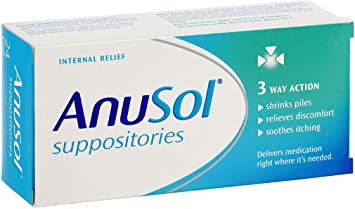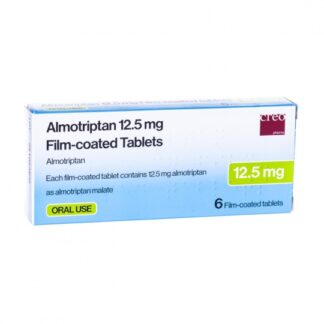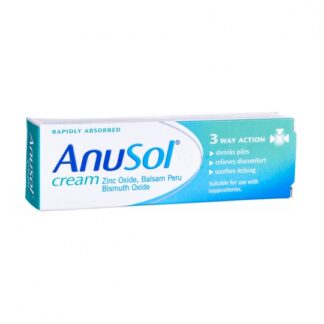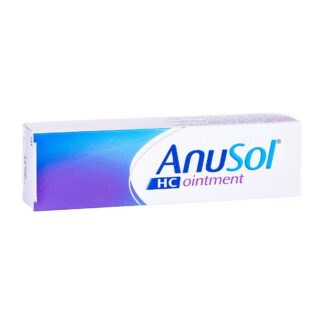- Lessen the inflamed piles
- Soothes discomfort
- Alleviates itching
- Genuine product since sourced in the UK
Anusol suppositories
Relieve the aches related to haemorrhoids by using Anusol suppositories, a medicine designed to soothe the symptoms of this condition. Learn about the ingredients of this medication, its proper use, the precautions, and the side effects by reading the article below.
- Lessen the inflamed piles
- Soothes discomfort
- Alleviates itching
- Genuine product since sourced in the UK
Fast Ordering
No appointment’s necessary, orders filled quickly
100% Confidentiality
Your information is secured and private
Discreet Packaging
Standard package with no stamps or markings
UK Medication
Dispensed by registered UK pharmacists
Frequently Asked Questions
What are Anusol - 24 Suppositories?
Anusol Suppositories are used to treat haemorrhoids or piles.
They contain zinc oxide, bismuth oxide, bismuth subgallate and balsam peru, while the Anusol cream contains just zinc oxide, bismuth oxide and balsam peru.
Anusol Suppositories are recommended for treating internal symptoms. The cream and ointments, however, can be used for both internal and external symptoms.
Before inserting suppositories, the cream and ointment may also be applied to make the process easier.
What are haemorrhoids?
Haemorrhoids, also known as piles, are dilated veins in your anus and lower rectum, similar to varicose veins. Haemorrhoids can be internal, developing inside the rectum, or external, developing under the skin around the anus.
Haemorrhoids are common among adults and may happen from time to time.
What causes haemorrhoids?
The veins around your anus tend to expand under pressure or may also bulge or swell. Haemorrhoids can develop from raised pressure in the lower rectum because of certain activities or factors such as:
- Straining during bowel movements
- Sitting for long periods on the toilet
- Having chronic diarrhoea or constipation
- Obesity
- Pregnancy
- Having anal intercourse
- Eating a low-fibre diet
- Regular heavy lifting
As you grow older, your risk of haemorrhoids also increases. This is because the tissues supporting the veins in your rectum and anus may have been weakened and stretched. This can also happen during pregnancy because the baby’s weight puts pressure on the anal region.
How to prevent Haemorrhoids?
Keeping your stools soft for easy elimination is one of the best ways to prevent haemorrhoids. Other tips for preventing haemorrhoids and reducing its symptoms include the following:
- Increase intake of high-fibre foods. Consume more fruits, vegetables and whole grains. This will soften the stool and increase its bulk, which will help you avoid the straining during elimination. Slowly add fibre to your diet to avoid having stomach gas issues.
- Increase fluid intake. Drink as much as six to eight glasses of water and other liquids each day to help keep stools soft. This doesn’t include alcohol.
- Consider taking fibre supplements. To get enough of the recommended amount of fibre which is 20 to 30 grams a day, consider over-the-counter fibre supplements, such as psyllium (Metamucil) or methylcellulose (Citrucel). This may help improve overall symptoms and bleeding from haemorrhoids.
If you use fibre supplements, ensure to drink more fluids or at least eight glasses every day. Otherwise, the supplements can cause or worsen constipation. - Avoid strain. Pushing too much and holding your breath when trying to pass a stool puts a lot of pressure in the veins in the lower rectum.
- Pass stool as soon as you feel the urge. Never hold a bowel movement, this may cause your stool to dry out and be harder to pass.
- Incorporate some exercise. Stay active to aid in hindering constipation and decreasing the pressure on veins, which can occur with long periods of standing or sitting. Exercise can also help decrease the excess weight that might be contributing to your haemorrhoids.
- Avoid long periods of sitting. Staying seated for too long, especially on the toilet, can raise the pressure on the veins in the anus.
What is Anusol used for?
Anusol is used to help reduce the discomfort associated with minor anal and rectal conditions. It delivers the medication straight to where it is needed and helps:
- Shrink the piles or internal haemorrhoids
- Soothe the itching that comes with the condition
- Provide relief from the aches associated
- Alleviate other anorectal related issues
How does Anusol work?
Anusol has mild antiseptic properties due to its active ingredients bismuth oxide, balsam Peru, zinc oxide and bismuth subgallate. Aside from that, it also has protective and astringent properties which means that it constricts blood vessels. Balsam Peru is also known to enhance the growth of new skin cells.
Want To Know More About Anusol - 24 Suppositories?
To achieve effective results from this medication, make sure to administer it properly. Also, take time to read the patient information leaflet that comes with its packet to be informed about the key information regarding this product.
To use Anusol Suppository:
Begin by washing the anal area clean. Dry it by gently patting with a soft towel before administering the medication.
Ensure to remove the plastic from the suppository before insertion. The suppository will then melt after being inserted.
Also, make sure to wash your hands before and after using Anusol Suppositories.
Adults should insert one suppository into the rectum in the morning, at night and after each bowel movement or as instructed by your doctor.
This product is for topical use only. Never take this medication orally.
If you are planning to use this product but is currently experiencing rectal bleeding or bloody stools, make sure to contact a doctor first before administering this medication. These symptoms may be a sign of an underlying health condition and may need another type of treatment.
If you have observed the condition has worsened or your symptoms persist despite the use of this medicine, discontinue use and seek advice from your doctor.
Medicines may cause some possible side effects to its users. These side effects may vary from person to person. The side effects stated here won’t necessarily apply to all people using this medicine. Discontinue the use of Anusol and consult your doctor if you experience any of these:
- Hypersensitivity or allergic reactions such as a rash to its ingredients
- Irritation during the application, such as a burning sensation, redness or itching.
- Contact dermatitis.
If you need more information about the possible side effects of using Anusol, you may ask your doctor or pharmacist. You may also refer to the leaflet that comes with the medicine.
This medicine is not intended to be taken by mouth. Accidental ingestion of this medication may cause gastrointestinal symptoms like stomach pain, nausea, vomiting and diarrhoea.
Anusol ointment, cream, and suppositories are not known to cause harm if used during pregnancy or breastfeeding. However, as with all medicines, it is advised to consult your doctor or ask the pharmacist first, before using Anusol if you are pregnant or breastfeeding.
It is uncommon for Anusol to affect any other medicines. However, like any other medicine, it may cause rare or unreported interaction with other drugs. If you are currently under another medication, always check with your pharmacist before using this or seek advice from a doctor.
Anusol is available online at True Medical. It is an over-the-counter medication, thus you can order it without prescription. However, it is best to adhere to the instructions stated on the patient information guide that comes with the medicine. You may opt for next day delivery after checkout of your order to receive the medication the following day.




